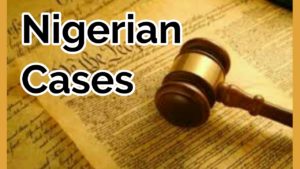The case of Awolowo v Federal Ministry Of Internal Affairs (1962) LLR 177 is usually cited when discussing the provision of the constitution on the right to fear hearing in Nigeria. More so, it is widely believed that the court applied the golden rule when interpreting the provision of the constitution in that case. Below are the facts, issues and decision of the court in the case.

Must read: Top 10 Richest lawyers in Nigeria 2024
Facts of the case of Awolowo v Federal Ministry Of Internal Affairs
The facts of the case are as follows: The appellant (Awolowo) who was standing trial for treasonable felony and conspiracy engaged the service of a British lawyer, Mr. E.F.N Gratiaen to defend him. On arrival in Lagos Mr. E.F.N Gratiaen was denied entry into Nigeria by the federal ministry of internal affairs (respondent). The court had to determine the import of section 21(5) (c) of the then constitution of the federal republic of Nigeria, 1960 which provided that “an accused person was entitled to defend himself in person or by legal representative of his own choice”. This is also the provision of section 36(6) (c) of the 1999 constitution of Nigeria. Awolowo contended that he was entitled to be represented by any lawyer of his choice whether Indigenous or British. Thus, the order prohibiting his lawyer, Mr. E.F.N Gratiaen was ultra vires and against his right to fear hearing. He therefore prayed the court to give an injunction restraining the defendant from preventing the said Mr. E.F.N Gratiaen (QC) or any other British counsel who might be counsel of the plaintiff’s choice from entering into Nigeria for the purpose of defending the plaintiff in the said charge.

Also read: History of the legal profession in Nigeria
On the other hand, the defendants argued that the provision of section 13 of the immigration Act which provide that “Notwithstanding anything in his ordinance contained, the governor-general may, in his absolute discretion, prohibit the entry into Nigeria of any person, not being a native of Nigeria”, gives the ministry the power to refuse a non-Nigerian entry into the country. More so, the defendant said that in exercise of the right in section 21(5) (c) of the 1960 constitution, the representative must be a qualified person entitled to a right of audience in Nigeria courts. Secondly, he must be available to take up the case, and therefore must be able to enter Nigeria as of right and must be a Nigerian.
Also Read: Fundamental human rights in the 1999 constitution of Nigeria
Decision of the court in Awolowo v Federal Ministry Of Internal Affairs
The High court of the federal territory of Lagos , Per Justice Udo Udoma held that based on the above provisions, the legal representative chosen by an accused person if resident outside Nigeria must be a person who could enter Nigeria as of right and must not be anyone under any disability. In the words of Justice Udo, “I must state at once that I do not accept as sound proposition the submission that the provision contained in Section 21 (5) (c ) of the Constitution, liberally interpreted, can be construed to entitle anyone to bring a Counsel from the United Kingdom for the purpose of defending him in a criminal charge. To accept that interpretation, would be to strain language. The Constitution is a Nigerian Constitution, meant for Nigerians in Nigeria. It only runs in Nigeria. The natural consequence of this is that the legal representative contemplated in Section 21 (5) (c) ought to be someone in Nigeria, and not outside it.” This decision was also affirmed by the Supreme Court of Nigeria.
Also read:
- How to become a successful lawyer: 7 qualities you need
- Are lawyers liars? See why lawyers are called liars here
Constitutional law – Fundamental human right:
This case borders on fundamental human right with specific reference to the right to fear hearing provided in section 21 of the 1960 constitution of Nigeria which is now section 36 of the 1999 constitution of Nigeria. Section (6)(c) of that section provides thus “every person who is charged with a criminal offence shall be entitled to defend himself in person or by, legal practitioners of his own choice.” The court in the case of Awolowo v Federal Ministry Of Internal Affairs (1962) LLR 17 held that the choice in that provision was limited to Nigerian lawyers alone. Thus, Awolowo had no right to be represented by a British lawyer.

Edeh Samuel Chukwuemeka, ACMC, is a lawyer and a certified mediator/conciliator in Nigeria. He is also a developer with knowledge in various programming languages. Samuel is determined to leverage his skills in technology, SEO, and legal practice to revolutionize the legal profession worldwide by creating web and mobile applications that simplify legal research. Sam is also passionate about educating and providing valuable information to people.
Interesting read
Thank you very much Chidiadi
I love this page. It has Been helping me through my law school bar 1 pre class assignments
Very apt and in a simple, understandable diction.
Woaw very much interesting.
Much love bro
I can help write on your blog I’m certified bloggers email
Pls I would like to know u
I am also studying Law
And I am finding it difficult to answer the question my lecture gave me
How did u do yours ??.